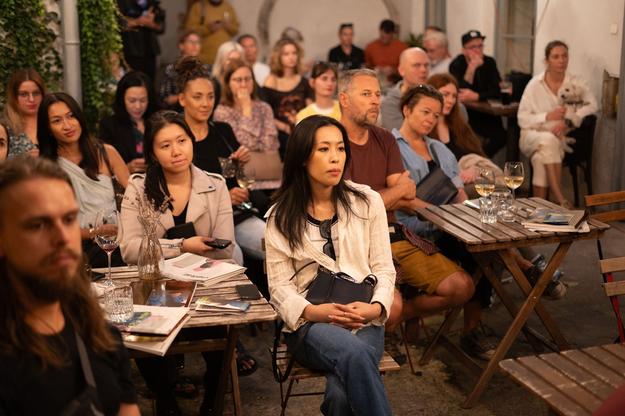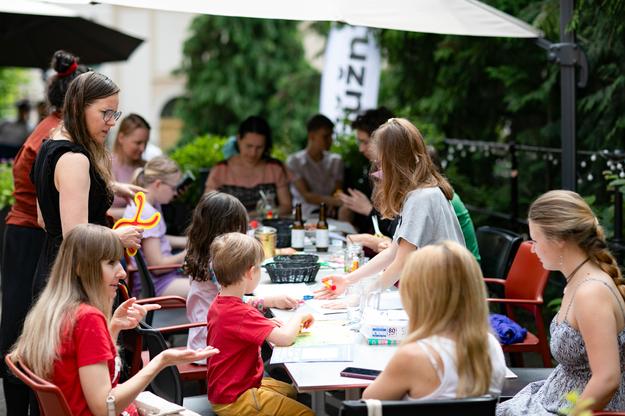Do foreigners in Slovakia follow what is happening in the country and try to change it for the better?
This simple question can reveal a lot about foreigners, in particular to what extent they are engaged in civic life and how they perceive Slovakia.
The Bratislava-based Milan Šimečka Foundation, in cooperation with sociologist Ivana Rapoš Božič, have published the results of a focus group qualitative research that paints a picture of foreigners’ participation in Slovak public life. Researchers talked to 19 foreigners living in Bratislava to learn more about their experience, their topics of interest regarding civic life, and the hurdles they have encountered during their attempts to participate.
Foreigners who took part in the survey
People from European and non-European countries, such as Macedonia, Croatia, Bulgaria and Ukraine, but also Vietnam, Canada, Ethiopia and Mexico.
Most of the involved respondents have lived in Slovakia for more than 5 years, but the length of their stay varied considerably and ranged from one week to 30 years.
Most of the respondents were of working age; several students and one pensioner also participated in the focus groups.
“The degree to which the people involved in our research are interested in public life in Slovakia varies, and reflects not only their personal interests and preferences, but also the length of their stay in Slovakia and their language competence,” explains MU sociologist Ivana Rapoš Božič.
Some of the respondents prefer to follow what is happening in the town or region where they live, because they feel that it has an immediate impact on their lives. Others are more interested in national politics. They like to compare the current political developments in Slovakia with the situation in their home country. Yet others feel that if they live in Slovakia, they should at least have a basic overview of Slovak politics.
“I probably follow national politics more than local politics. It’s not so easy to find information about local politics,” one of the respondents told interviewers. Nevertheless, many of the 19 respondents described national politics as a source of disappointment and frustration in the survey.
Slovak politics is "like Netflix"
In fact, a respondent compared Slovak politics to a never-ending everyday ‘drama’.
“Watching Slovak politics is like watching a series on Netflix,” he said to experts.
Unlike national politics, many respondents based in Bratislava perceive local politics more positively. One of the reasons is Bratislava mayor Matúš Vallo and his effort to actively communicate with foreigners. The city, for example, published a Bratislava prospectus for newcomers in English and Russian on its website in 2022.
“I don’t know much about him [Vallo] or if he’s good enough. All I know is that he plays in a band and approaches foreigners,” says a respondent. “So I think maybe there’s a way to actually get more involved and know more about what’s going on in the city.”
As Rapoš Božič explains, respondents who have lived in Slovakia for some length of time are more eager to follow what’s happening in the country. “Not only do they feel that they are part of Slovak society, but with the amount of contact they have with the locals, their awareness of what’s going on usually grows as well,” the sociologist says. But as the survey shows, foreigners who have relocated to Slovakia more recently also want to know more about and get involved in Slovak civic life. A case in point: a female respondent who came to Slovakia two years ago decided to vote in the 2022 local and regional elections.
“I think when a person moves to another country it’s their personal responsibility to be interested in politics,” she told researchers. Respondents agree that, unless they understand Slovak, it’s hard for them to access relevant information about politics in Slovakia. Non-Slovak speaking foreigners turn to Radio Slovakia International and The Slovak Spectator for such information in English.
“At Radio Slovakia International, they produce radio programmes and articles; from time to time they tell the international community about important events that concern foreigners. However, it’s still very limited,” thinks a respondent who finds Slovak politics interesting. Social media and the Facebook group Foreigners in Bratislava is an important source of information – mostly practical – for foreigners.
How foreigners help Slovaks
Several respondents were prompted to become involved in civic life thanks to their own migration experience, according to the survey, and they specifically decided to assist other foreigners who came after them in navigating them through life in Slovakia. “I tried to help people from Macedonia or the Balkans who also came here. We are citizens of third countries and face more difficult challenges than others,” a Macedonian respondent told researchers. While some organise language cafes and introductory workshops for newcomers, the Horovod civic association founded by Ukrainian, Belarusian and Russian people organises art events in Bratislava to make newcomers feel included.
Although these cases show how foreigners primarily help foreigners, Rapoš Božič emphasises that such engagements can also contribute to changing the perception of the role of foreigners in Slovak society. Other respondents are engaged in initiatives that focus on minorities in the country. A lawyer included in the focus group, for example, educates people in Slovakia on human rights and the rights of minorities. Through different activities, he has been trying to help root out discrimination and racism against Roma people. Another respondent, a dancer, used her talent to hold a dance workshop to fight homophobia in Slovakia after the killings in 2022 of two queer people outside an LGBT+ club in the capital.
“It [homophobia] is something I don’t agree with,” she told interviewers “I’m glad I did it.”
Moreover, many respondents have said that they also support initiatives that concern all of society and touch on different topics, ranging from corruption via traffic problems to the environment, because they want to see the society they live in progress and thrive. Some don’t even mind taking part in mass protests.
“I protested alongside Slovaks because I live here and share the concerns of the locals,” a respondent shared his experience with researchers.
He added that there are many foreigners who really want to call Bratislava home. The sociologist stresses that the diversity of topics of foreigners’ interest is important, as it points to the ability of foreigners to relate to different communities within their civic involvement.
“Their experiences prove that they are fully-fledged actors in civil society,” Rapoš Božič says.
Barriers
Yet, it is not always easy for foreigners to get involved within different communities. The language is often identified as the biggest barrier. The sociologist, for example, says that foreigners may feel discouraged from taking part in events if they are organised in Slovak, but Slovaks may find themselves in a similar situation if an event is held in a foreign language.
“They must therefore decide which language they will use in communicating with the public, and consider the consequences that this decision will have on the people who would like to participate,” the sociologist adds.
In the survey, the respondents also admitted that they lack a deeper understanding of the functioning of Slovak public institutions. “Such an understanding often goes beyond linguistic understanding and primarily requires knowledge of unwritten rules,” Rapoš Božič explains. A lack of knowledge of unwritten rules can translate into, for example, difficult access to financing, she continues.
“I suspect that when you respond to an open grant funding opportunity, there are things that are not said and that are distinctly Slovak,” a respondent told interviewers. “And that’s fine, but you know, I don’t know them.”
Moreover, the survey has found that some respondents perceive Slovakia as a country where a person needs to know people in key positions to get something done. Some foreigners in the focus group also consider their position in Slovak society to be insufficiently legitimate to initiate changes themselves, and prefer helping local civic associations or individuals.
“I’m still of the opinion that when it comes to things we want to change in society, we should be represented by someone who is not from abroad. Without them, they may not take us seriously,” claims one of the respondents in the survey.
But others, especially those who have lived in Slovakia for many years or grew up in the country, believe that they have the same right to change things in Slovakia as Slovak people. A foreigner, who said about herself that she “looks different” and tried to get involved in Slovak political life in the past, told interviewers that she didn’t believe she could succeed in Slovak politics because of her appearance.
“I still don’t think that foreigners have many chances in politics. And that’s a shame,” she said. She also highlighted the different perspectives that foreigners can bring to the table. “And I’m the kind of Slovak who sees differences and can bring slightly different perspectives.”



 (source: Pixabay)
(source: Pixabay)
 A discussion during the fjúžn festival in Bratislava in September 2023. (source: Erik Boroš)
A discussion during the fjúžn festival in Bratislava in September 2023. (source: Erik Boroš)
 A children’s activity during the fjúžn festival in Banská Štiavnica in 2023. (source: Pavol Laco)
A children’s activity during the fjúžn festival in Banská Štiavnica in 2023. (source: Pavol Laco)